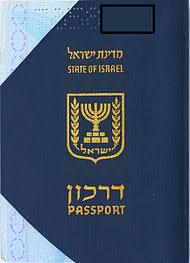 |
| Wikipedia |
Can you apply for an Israeli passport before your one-year aliyah anniversary, to be used after the one-year anniversary?
I recently experienced a situation at the Misrad HaPnim (Interior Ministry) while trying to get passports for my family whose resolution is apparently not in the office's protocol.
While the laws and regulations promulgated in any government system seek to streamline daily life by clearly spelling out the rules that apply in any given situation, because rule-makers cannot anticipate every situation lawyers and courts exists to fill in the gaps. But sometimes there are situations where lawyers and courts are not practical. That's where blogs come in. In case anyone has the same issue, here is my experience:
According to Nefesh B'Nefesh, a nonprofit organization established in 2001 to help North American and British Jews make Aliyah, "You are entitled to apply for an Israeli passport one year after your Aliyah, provided that you have spent 365 cumulative days in Israel." If you are traveling outside of Israel before the one-year anniversary of your aliyah, you need to apply for a teudat ma'avar (travel pass).
But what if... you are leaving Israel 10 days after the one-year anniversary of your aliyah?
On the one hand, you are not entitled to apply for a passport until your one year is up. On the other hand, you are not traveling within the one year so you don't need a teudat ma'avar.
This is the question that had the clerks stumped and required 3 trips to the Misrad HaPnim. On the first trip, approximately 20 days before the scheduled flight, the clerk (Clerk 1), after discussing it with a supervisor, said we should come back on the first day of the calendar month of the flight and we can apply for passports. On the second trip, the clerk (Clerk 2) stamped our paperwork and after discussing it with the first clerk and two supervisors, told us to come back the day after our one-year aliyah anniversary and apply for the passports because the computer system cannot process a passport request before that time. So, on the third trip I hope to complete the process.
*UPDATE* On the third trip- the clerk (Clerk 3) started to give me a hard time even though the paperwork was already stamped. She asked me who stamped the papers. Luckily, I remember what she looked like and Clerk 3 went to find Clerk 2 and brought her over. After Clerk 2 said she remembered me, Clerk 3 told her that next time she should write on the top of the page "This child appeared before me" and then stamp it. Clerk 3 said that had I not been able to identify Clerk 2 we would have had a problem. So just to safe, I surreptitiously took a photo of both clerks standing together.
I have to go back for a fourth time now to pick up the passports.
*UPDATE 2* On the fourth trip- I told the woman in the office I was there to pick up my passports and she asked if I had a receipt. No, I didn't have a receipt, they just told me to come and pick them up. So she checked the box and voila they were there.
Conclusion: You cannot even apply for a passport until the one-year anniversary of your aliyah has passed. Had our flight been scheduled for the day after our one-year anniversary we would have to shell out money for a teudat ma'avar and a passport.
FYI: The Misrad HaPnim branch in Jerusalem on 1 Shlomzion HaMalka St. is open S, M, Tu, Th from 8-12 and Monday and Wednesday afternoons from 2:30-5:30 (but not for visas and citizenship).


